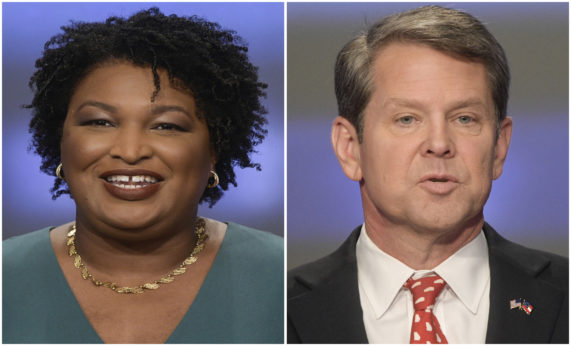
With the mainstream media obsessed over Kanye West and Donald Trump’s latest ploy for attention and the revelation that Senior White House Adviser Stephen Miller used to sniff glue back in elementary school, a new report by the Associated Press that thousands of voters are being purged from the voting rolls is not getting the attention it deserves.
The AP revealed this week that on the last day of voter registration in Georgia, over 53,000 voter applications remain sitting on hold at the Secretary of State’s office due to the “exact match” policy. A majority of those voter applicants are African-American.
Many eyes are on Georgia as we near the 2018 midterm elections, given the fact that if Democratic candidate Stacey Abrams wins, she will be the first Black female governor in the history of the United States. The progressive Abrams is up against Republican Brian Kemp—who also happens to be the current Secretary of State, meaning his office is the one in charge of the crucial voting rolls in Georgia. Despite the Abrams campaign and voting rights advocates pointing out the potential conflict of interest, Kemp is refusing to leave office before the election.
According to AP, Kemp’s office flagged the nearly 53,000 voter applicants under the state’s “exact match” process. Under this rule, the information on a voter application has to match exactly with the data on file at the Social Security Administration and the state’s Department of Driver Services. If the information does not match, and this can happen often due to issues such as a person’s middle name not being fully written out, misspellings, and the like, an application is held for further screening.
Abrams has called Kemp a “remarkable architect of voter suppression,” while Kemp’s office blames the New Georgia Project, a voter registration group founded by Abrams, for the issues voters are having with the exact match rule. Kemp’s office told the AP that the New Georgia Project “did not adequately train canvassers to ensure legible, complete forms.”
Kemp’s office maintains that “the law applies equally across all demographics.” This despite the fact that African-American voter applicants make up 70 percent of the 53,000 on hold, while Georgia’s Black population is only 32 percent. This racial disparity in voting rights is a crucial one given the fact many believe the turnout of people of color will play a major role on election day.
The Director of Strategic Communication for the Abrams campaign, Abigail Collazo, issued a public statement this week saying, “As he has done for years, Brian Kemp is maliciously wielding the power of his office to suppress the vote for political gain and silence the voices of thousands of eligible voters—the majority of them people of color…. This isn’t incompetence; it’s malpractice. It is no surprise that Kemp is reprising these tactics now when multiple recent polls show his race against Stacey Abrams to be a dead heat…. The Secretary of State’s office must do away with the discriminatory ‘exact match’ program and process all voter registrations immediately.”

The Lawyers’ Committee for Civil Rights Under Law filed a lawsuit on October 11 against Kemp’s office, claiming the “exact match” rule is discriminatory. This complaint joins those made by members of the SCLC, Rainbow-PUSH Coalition, the Georgia Coalition for the People’s Agenda, and the New Georgia Project, who announced earlier this month their plan to file a federal lawsuit against Kemp’s office for purging nearly 700,000 voters from the state’s voter rolls over the past two years.
“It’s a stain on our system of democracy when less than a month before an election which could produce the first African-American female governor in our nation’s history, we are seeing this type of voter suppression scheme attempted by a state official whose candidacy for the governorship produces an irremediable conflict of interest,” said NAACP President and CEO Derrick Johnson to the press.
The voter suppression happening in Georgia is connected to a larger anti-democratic effort underway across the country. The rights of voters have been under attack since the removal of a major provision in the Voting Rights Act (VRA) by the Supreme Court in 2013. This provision required that lawmakers in states with a history of discriminating against minority voters had to get federal permission before changing voting rules. This provision applied to Georgia, along with 14 other states. Since this change to the VRA, many of these same states have implemented stricter voter registration rules, often targeting voters of color.
With the midterm elections less than 30 days away and an unprecedented number of women of color running for public office, along with progressives and other people of color, voter turnout will be key. Yet, suppressive voting rules are throwing hurdles in front of many potential voters, possibly preventing them from turning out to support their candidates of choice.
To check your voter registration status, visit this website.










